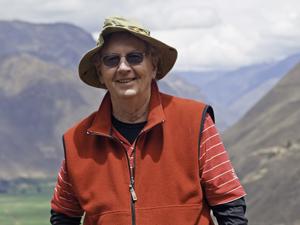Richard S. Stolarski, research professor in the Morton K. Blaustein Department of Earth and Planetary Sciences, died Feb. 22 of cancer. He was 82.
Specializing in the theoretical physics and chemistry of atmospheres with an emphasis on stratospheric and tropospheric chemistry, Stolarski was known for his analysis of satellite ozone data and determination of long-term changes in ozone.

Stolarski played a critical role in the discovery of the ozone hole, finding that the depletion detected by Joe Farman and the British Antarctic Survey was also found in NASA's satellite measurements, said Anand Gnanadesikan, Morton K. Blaustein Chair of the department, adding that this work set the stage for managing the response to the ozone hole, one of the great successes in environmental protection in recent decades. In recognition, Stolarski received the U.S. Environmental Protection Agency's Stratospheric Ozone Protection Award and the United Nations Environment Programme's Global Ozone Award.
"He lived a life that was full of gratitude for his work, his colleagues, and his family, showing grace and generosity to those of us who knew him," Gnanadesikan said. "He was a passionate photographer and recently published a book of the photos he took since 2020. Paging through them, you see the picture of someone who lived a rich life, taking joy in his work, the natural world, ideas, and family."
Before coming to Johns Hopkins in 2010, Stolarski was a research scientist at NASA's Goddard Space Flight Center in Greenbelt, Maryland, for more than 30 years. He arrived there in 1976, just in time to join a fledgling branch created to study the ozone layer, and saw the research through to the 1987 Montreal Protocol, which banned the production of many ozone-depleting substances. He remained committed to the healing of the planet throughout his career.
Anand Gnanadesikan
Chair, Department of Earth and Planetary Sciences
"He lived a life that was full of gratitude for his work, his colleagues, and his family, showing grace and generosity to those of us who knew him."
"He was an exceptional scientist, and a wonderful, kind man," said Darryn Waugh, a professor in the department who had known Stolarski for 30 years. "He was very generous with his time, and always more than willing to discuss science, golf, and the world around us. I remember many helpful conversations with Rich when I was a young postdoc and new to ozone research, and have observed many such interactions between Rich with students and postdocs during the years he was at Hopkins. Rich has not been in Olin Hall over the past four years, and he has been sorely missed."
Associate research scientist Marie-Aude Pradal shared an office with Stolarski for 10 years, and described him as an accomplished scientist, family man, and photographer who loved to share what he had learned throughout his life. "He was a living legend with an aura that radiated love for his work, love for science, and love for communicating about it. He is irreplaceable to me," she said.
When graduate student Ali Siddiqui was preparing to teach a course last fall on the history of climate, he remembered talking with Stolarski about his writings on the history of the discovery of the ozone hole, and asked him to give a guest lecture to the class. The students were fascinated with the science and the process, Siddiqui said, asking questions about why the Kyoto Protocol and Paris Agreement weren't as effective as the Montreal Protocol.
"He was really insightful about those things, and had interesting things to say about how scientists tend to interact with politicians and administration," Siddiqui said. Siddiqui also remembered how supportive of students Stolarski was, even in retirement, when he remained an active participant in discussions and committee meetings. "He would ask a lot of questions, and make us think about the research we were doing," Siddiqui said.
A native of Washington, Stolarski earned a BS in physics and mathematics at the University of Puget Sound in 1963, and a PhD in physics at the University of Florida in 1966. He was a Fellow of the American Geophysical Union and an honorary lifetime member of the International Ozone Commission, and was awarded NASA's Exceptional Achievement Medal.







